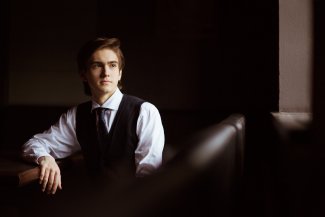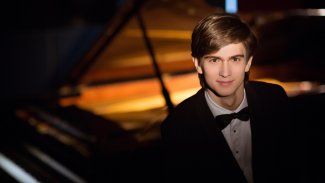
Kharitonov on Beethoven & Tchaikovsky
20/3/2020
Daniel Kharitonov talks about two composers that have meant a lot to him and his musical career, Beethoven and Tchaikovsky.
On Beethoven:
Beethoven has played a huge role in my life. Since I first performed his First Piano Sonata when I was very young, I have played his piano sonatas and concertos many times.
The most important thing when performing his music is the balance between having a strong structure and providing the entire spectrum of the emotions he creates. His music is firstly great drama and you should never forget this.
I concentrate on the images he was drawing in his music. The characters change so often – for example from grandioso to pastoral – and you need to show these differences to the listeners.

It’s important to know the background to his sonatas, because most of them have special stories and interesting dedications. His piano sonatas were creative laboratories for his other music, so he would try something for the first time in his sonatas and then use it in his symphonies, in a larger form. For example, he used ideas from the ‘Appassionata’ Sonata in his Fifth Symphony, and the N.21, opus 53 in C‑Major, “Waldstein” Sonata in the Sixth Symphony. It’s so interesting to see this experimentation in his piano sonatas.
He was possibly the first composer of his time who hadn’t played the harpsichord and chose to play the fortepiano – he was an amazing virtuoso pianist. He changed performance style for the piano: it was not only about very fast and technical playing; it was also about the pianist as hero. Contemporary records show that he played with a lot of emotion and was like a volcano – people who heard him talked about that.
There’s an energy and push to his music that is different to Classicism, but not yet Romantic – he was the bridge between them, but it’s somewhere in the middle and you need to make a good balance between the two aspects. There are so many details to discover – even if I’m 90 I will still find something new.

On Tchaikovsky:
There are popular piano concertos and very popular ones, and there’s Tchaikovsky’s First Piano Concerto – it may even be the most popular concerto in the world. Most people can recognise the opening chords and the incredibly beautiful themes.
It’s a special work for me. I never get tired of it, but it’s a special task to make such a well-known work sound new, to discover something fresh in it. However, the music gives you so much freedom, and every performance is open. His music is so full of emotion, especially in this concerto, and whenever I perform, I feel the melodies and harmonies differently – maybe because I’m breathing another air – and new ideas comes to me. It’s always spontaneous, but of course I try to stay within the frameworks of form and structure.

There is a special feeling being Russian and playing Tchaikovsky – it’s probably the same for German musicians playing Beethoven and French ones Ravel. But it’s just a feeling in your heart – not something you show. Tchaikovsky’s music is based on Russian folk songs and motifs, and he gives you so many characters and images of Russian nature and of the people, so I’m always drawing those pictures in my head. But you don’t need to show everyone that you’re playing in a special way – it just comes from the heart. You don’t need to be too serious about it.



